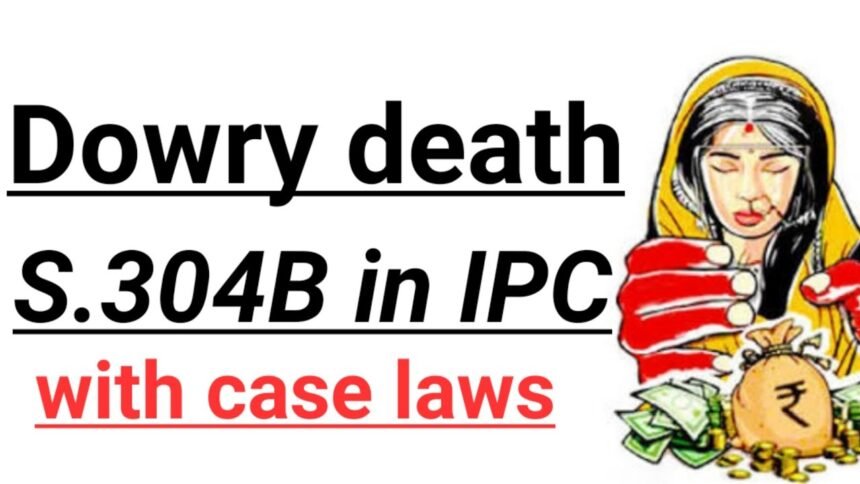In recent years, the judicial discourse around dowry death cases has drawn significant attention from legal professionals, academicians, and the public alike. The landmark Supreme Court decision on Section 304B of the Indian Penal Code (IPC) not only redefines the parameters for what constitutes a dowry death but also underscores the importance of adhering to evidentiary standards in criminal proceedings. This blog examines the nuances of Section 304B IPC in the context of the Supreme Court’s recent verdict, offering a comprehensive analysis for legal professionals and enthusiasts.
In this blog, we will break down:
✅ What Section 304B IPC says about dowry death
✅ How Section 113B of the Indian Evidence Act plays a role
✅ The Supreme Court’s decision and its significance
✅ How this verdict impacts future dowry death cases
Understanding Section 304B IPC
Section 304B IPC deals with “dowry death” – a term legally defined as the unnatural death of a married woman within seven years of marriage, where it has been proven that the woman faced harassment or cruelty over demands for dowry. Under this provision, if the victim’s death is a result of:
- Burns or injuries inflicted by fire,
- Bodily injuries caused by physical assault, or
- Any unnatural death (including suicide),
and if it is established that such cruelty or harassment over dowry demands preceded the death, then the death is legally classified as a dowry death.
The Role of Section 113B of the Indian Evidence Act
Complementing Section 304B is Section 113B of the Indian Evidence Act. This section introduces a crucial evidentiary presumption: if the death of a married woman occurs within the stipulated period (i.e., within seven years of marriage) under unnatural circumstances, and there is evidence of harassment or cruelty over dowry, the court is compelled to presume that the death is a dowry death—unless the accused can prove otherwise. This statutory presumption places a significant evidentiary burden on the prosecution while also demanding that the defense produce counter-evidence to challenge the allegations.
The Supreme Court’s Decision: Key Highlights
In the recent case under review, the Supreme Court scrutinized the lower courts’ approach in categorizing the incident as a dowry death. Here are the pivotal aspects of the judgment:
1. Reaffirming the Essential Elements
The Court meticulously reiterated the essential ingredients that must be established for a dowry death case under Section 304B IPC:
- Temporal Proximity: The death must occur within seven years of marriage.
- Nature of Death: The death should be unnatural—be it by fire, physical assault, or other means, including suicide.
- Evidence of Dowry Harassment: There must be clear evidence that the victim was subjected to dowry-related harassment or cruelty prior to her death.
2. Evaluating the Evidence: The Crucial Role of Initial Police Statements
A significant portion of the Court’s analysis centered on the statements provided by the victim’s family. In this particular case:
- The mother’s testimony, taken on multiple occasions by the police, contained discrepancies. Initially, no mention was made of dowry harassment or cruelty.
- Subsequent statements appeared to introduce elements that were inconsistent with the initial narrative, suggesting that external influences—possibly legal counsel—may have altered the family’s account.
- The victim’s brother’s testimony, similarly, did not corroborate the narrative of dowry harassment.
The Court observed that if the case were a genuine instance of dowry death, such critical details would have been evident in the first recorded statements. The absence of any mention of dowry-related issues in the initial reports cast serious doubts on the credibility of the later allegations.
3. Critique of Lower Courts’ Approach
The Supreme Court was unequivocal in its criticism of the lower courts:
- Misapplication of Law: The trial court and the High Court were faulted for hastily categorizing the incident under Section 304B IPC without robust and consistent evidence.
- Evidentiary Lapses: The failure to thoroughly analyze the initial police records and the evolving nature of witness testimonies was highlighted as a major shortcoming.
- Judicial Training and Standards: The judgment emphasized the need for better training for judicial officers, particularly at the trial level, to prevent the misapplication of legal provisions in sensitive cases like dowry death.
4. Implications for Future Dowry Death Cases
This decision sets a vital precedent:
- Evidence Integrity: Courts must rely on the integrity of the initial evidence collected. If the foundational statements lack any reference to dowry harassment, later additions cannot be the sole basis for such a serious charge.
- Balanced Judicial Approach: The verdict urges judicial officers to adopt a balanced and meticulous approach, ensuring that both the prosecution and the defense meet their respective burdens of proof before concluding.
- Preventing Miscarriage of Justice: By stressing the necessity of clear and consistent evidence, the decision safeguards against the potential misuse of Section 304B IPC, ensuring that false or unsubstantiated cases do not lead to wrongful convictions.
Concluding Thoughts
The Supreme Court’s recent decision on Section 304B IPC is a clarion call for judicial prudence in dowry death cases. It reaffirms that while the protection of vulnerable women is paramount, the principles of natural justice and the rule of law must remain sacrosanct. The case serves as an important reminder that legal provisions must be applied with due diligence and that evidentiary integrity is the cornerstone of a fair judicial process.
For legal professionals, this judgment is not merely a commentary on a specific case—it is a directive to ensure that every element of the law is critically examined and that the rights of all parties are preserved. As the legal community continues to navigate the complexities of dowry death cases, this decision will undoubtedly serve as a benchmark for both prosecutorial and judicial conduct.
Stay tuned for more in-depth legal analyses and updates on landmark judgments that shape our legal landscape






